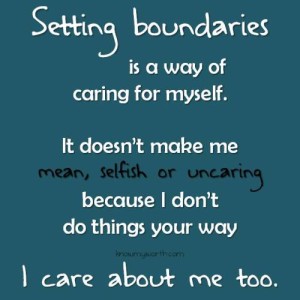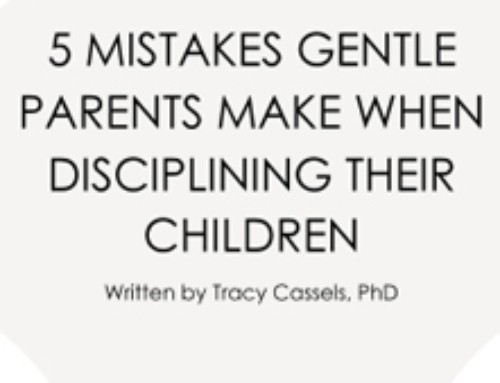 The discussion of boundaries is an inevitable one amongst parents. We know that we have to set boundaries for our children as it keeps them healthy, happy, and safe. Despite all this, many people get very confused about where we ought to set boundaries. Those of us who practice “gentle” parenting are often accused of being too permissive; I myself have been told my daughter is a spoiled brat because I don’t punish and try to work with her instead of against her. (Interestingly, I have never been told this by anyone who has actually met her. It’s all from people online reading snippets of our lives as I share them in pieces.) I think this is to do with the fact that we have a skewed view of what constitutes a boundary and very little understanding of what a boundary actually is.
The discussion of boundaries is an inevitable one amongst parents. We know that we have to set boundaries for our children as it keeps them healthy, happy, and safe. Despite all this, many people get very confused about where we ought to set boundaries. Those of us who practice “gentle” parenting are often accused of being too permissive; I myself have been told my daughter is a spoiled brat because I don’t punish and try to work with her instead of against her. (Interestingly, I have never been told this by anyone who has actually met her. It’s all from people online reading snippets of our lives as I share them in pieces.) I think this is to do with the fact that we have a skewed view of what constitutes a boundary and very little understanding of what a boundary actually is.
Society’s boundaries. And why they aren’t healthy boundaries.
The problem, it seems, is that in our society, boundaries have become synonymous with rules for sleeping, eating, and punishment, and little else. Yet these are the very things we probably ought to not be too strict about (or simply ignore altogether in the case of punishment). For example, in the case of sleep, often the “boundary” is setting a strict bedtime (even in infancy) and yet this ignores the biological rhythms of the child involved (often mismatching with the time when a child should sleep), in younger children ignores the development of the circadian rhythm, and can make bedtime a trying, stressful experience that can led to stressful sleep.
In place of the sleep schedule, parents should be focused on creating a set but flexible routine that helps their child feel safe with sleep and uses their child’s signs of tiredness to determine an appropriate bedtime. If your child has to wake early in the morning then they should be tired earlier and parents should be aware of signs of overtiredness, but if their natural circadian rhythm is one that involves later to bed and later to rise, families may need to look at alternatives as can pose problems for these children to be forced to an early bedtime or to wake early (for more information, you can ask your doctor or look up information on delayed sleep-phase syndrome).
I have heard parents suggest children must eat at a certain time or not at all, akin to putting babies on a feed schedule which we know is associated with greater obesity later on. Eating should be done when a child is hungry and not because it is a specified time. The ‘what’ of what you eat is where boundaries need to come into play for some children. For example, your child is hungry at 9am for breakfast and wants chocolate cake; you don’t need to give in (though you may make special days of it if it’s something you want to do in your family but this should be set up ahead of time), you can offer a selection of good foods and let your child pick. And when your child is full, you leave it. I’m pretty sure we’ve all had days where we aren’t hungry at set times yet we don’t starve ourselves when hunger hits because we know how awful it is for us and our functioning.
Finally, punishment is not boundaries. Punishment is punishment. In another piece I shared my story of my daughter having a meltdown in the grocery store at around 18 months of age as she tried to communicate and I couldn’t understand. I gave her 10 seconds to just let it out while I counted with her then focused on trying to understand what was wrong. She finally was able to communicate that she wanted the small grocery cart so we went to get one. People have accused me of being “permissive” in this instance, of not setting the boundary that a tantrum will not be allowed, and in turn, that I gave her the impression that having a tantrum will get her what she wants.
What they all missed was that this wasn’t a tantrum because she asked and I said no (we’ve had those and she doesn’t get what she wants in those moments because I have good reasons for my “no”, but I still comfort and hold her during these times of intense emotion). She was frustrated at her inability to communicate what she wanted and that is not something I would ever set a boundary to. I want her to know that I will work to understand her, especially at times when she clearly can’t communicate in the way she wants. Once I understood her problem, I could help her find a cart and not for one instant do I think she associated her tantrum with the cart. Punishment here would have been shutting down a key line of communication between my daughter and I and that is not something I encourage any parent to do.
If a child is older and having a tantrum, sit with them and work it out; for several years, these will happen because their brains end up on overload. If you want to curb them, don’t punish but understand their physiological limitations and then talk to them about alternatives to expressing themselves once everyone has calmed down. (There is no point to talking when a child is worked up as they simply can’t process and retain it. Frankly, us adults are like that too.)
What boundaries are and why they are healthy.
 Boundaries are for the things that we need to do to keep our kids safe and to keep our lives running smoothly while respecting the needs of everyone in the house. It can be saying no to having children in the bathroom with you. It can be having chores that need to be done on a weekly basis. It can be limiting the amount of screen time your children have each day. It can be limiting unhealthy foods. It can be saying no to dangerous behaviours (and this will vary family to family). It will be the acts that you feel your child needs to know and needs you to enforce because they simply don’t have the capacity to do that on their own (and this is different than they are doing it differently than we would like).
Boundaries are for the things that we need to do to keep our kids safe and to keep our lives running smoothly while respecting the needs of everyone in the house. It can be saying no to having children in the bathroom with you. It can be having chores that need to be done on a weekly basis. It can be limiting the amount of screen time your children have each day. It can be limiting unhealthy foods. It can be saying no to dangerous behaviours (and this will vary family to family). It will be the acts that you feel your child needs to know and needs you to enforce because they simply don’t have the capacity to do that on their own (and this is different than they are doing it differently than we would like).
Some families will have more than others, and more or less does not dictate the quality of your parenting. You can be quite strict with many things in your house and still be utterly responsive and gentle and caring when these things are ones that make sense in your household and you explain them. You can also be more lenient so long as you do have boundaries somewhere because no child is fully ready to make all their decisions.
Important in setting boundaries is that they are done and enforced with empathy and love. Saying no and yelling at your child because s/he asked again to watch another TV show is not enforcing boundaries, rather it is instilling fear and anger in your child. Along with this is allowing your child to feel and express their upset or anger at the boundary or your enforcement of it. We all feel disappointment when we can’t have something we want and children are learning how to actively cope with that disappointment. This goes doubly for younger children and toddlers who truly struggle to physically contain those emotions.
If your child is expressing their discontentment in ways that are socially inappropriate or physically violent, after the period of upset has passed, talking about things like not screaming, hitting, and so on is absolutely appropriate, but it does no good in the moment. Further, modeling your own reactions to disappointment is helpful for little ones who are always trying to pick up what to do from what goes on around them. Don’t hide your disappointments, talk to them about how you feel about them and show them how you cope.
Something that many gentle parents struggle with is the idea of bargaining or pleading with their children. Bargaining or pleading is not setting boundaries, it’s asking your child to make the decisions you are supposed to be making. However, this doesn’t mean not listening to your child. If your child has good reason for asking something in a particular situation, it’s okay to discuss. It’s also okay to change your mind every once in a while.
My daughter caught me on this one the other day. We have a set TV time each day but I had promised her a movie night with me on a weekday when her dad was going out for the night. Not thinking of that, I let her watch her TV quota during the day while saying nothing about movie night. When she asked about it at night, I was a little embarrassed to have forgotten and then told her that she had watched her TV for the day. She was upset and reminded me I had promised her movie night. She was right and I was wrong. In letting her watch TV I had not given her a choice to watch those shows or movie night simply because I’d forgotten. I could have stood my ground in an attempt to be consistent, but what would I have taught her about my word? So I sat down with her, explained my mistake and said we would do movie night as I promised, but going forward, if we’re doing movie night during the week then that’s the TV time for the day. She understood and we had a wonderful evening together.
In short, while boundaries need to be consistent, you don’t need to be militant about them. For example, you can limit TV to an hour a day but say that there can be an extra movie with friends on the weekend. Or if there’s a special occasion, you can do desserts when you might not normally. The key to the inconsistencies is being able to explain it appropriately to your kids. Like many things, when they understand the reasons, they become better able to put the special situation in context.
***
Boundaries are important for our children. Knowing you’re looking out for them helps them feel safe and can curb a lot of negative behaviours. Not because you scare it out of your kids but because they don’t need to act out in the first place. (Though if you’re expecting no tantrums or outbursts, you need to reset those expectations.) However, we need to be sure that we’re setting the right kind of boundaries and not setting ones that either counter their own biological needs and rhythm or that serve to shut down communication with them. One thing to think of when you’re planning a boundary: Setting boundaries is one of the ways you are teaching your child, so what is it you want to teach them in the long-term?






I get this from people sometimes too; that when my kids are throwing a tantrum that I’m not doing enough in that moment to shut it down. Gentle parenting is so much harder than how I was raised, so much work, because yelling at and spanking them is easy. It’s quick. It stops the behavior right away. But what am I teaching my kids when I do that?
I keep being accused of only reading articles which are “in line with my natural parenting choices”. I keep trying to explain that actually following a Genule parenting path is bloody hard work as it’s not my natural style of parenting. Shouting at my child and being strict and enforcing limits with strength and anger is actually my natural style and every day I have to fight that and consider my choices to be what I know is a better parent. To be gentle and lead my child, not drag him kicking and screaming.
I’ve been really struggling recently as he fights against pretty much everything i try to do. Everything is a battle and it’s exhausting and I am losing my path to gentle parenting and resorting more and more to knee jerk reactions. I feel like we’re in a downward spiral and I know it all comes down to boundaries and having too many. We never used to have battles when I was more laid back. I’m just not sure how to get back to where we were or if I should continue to set clear boundaries and wait for this “must say to no everything my parents suggest” phase is over.